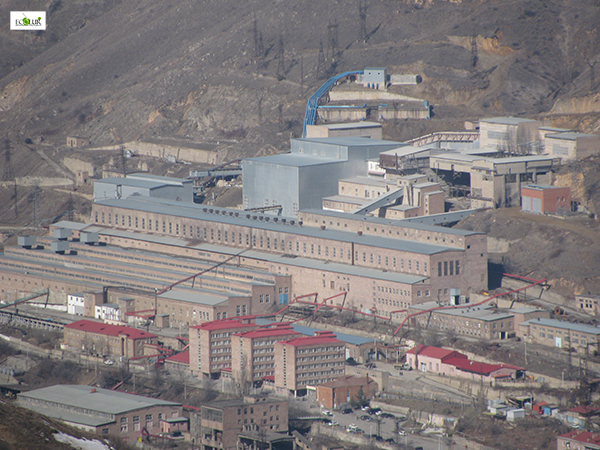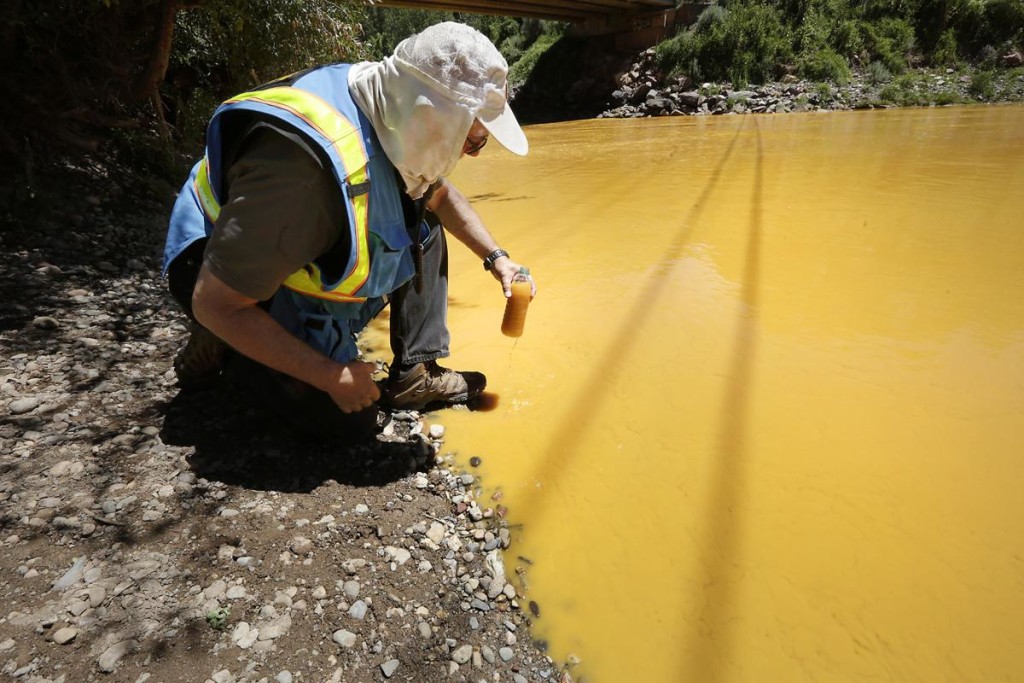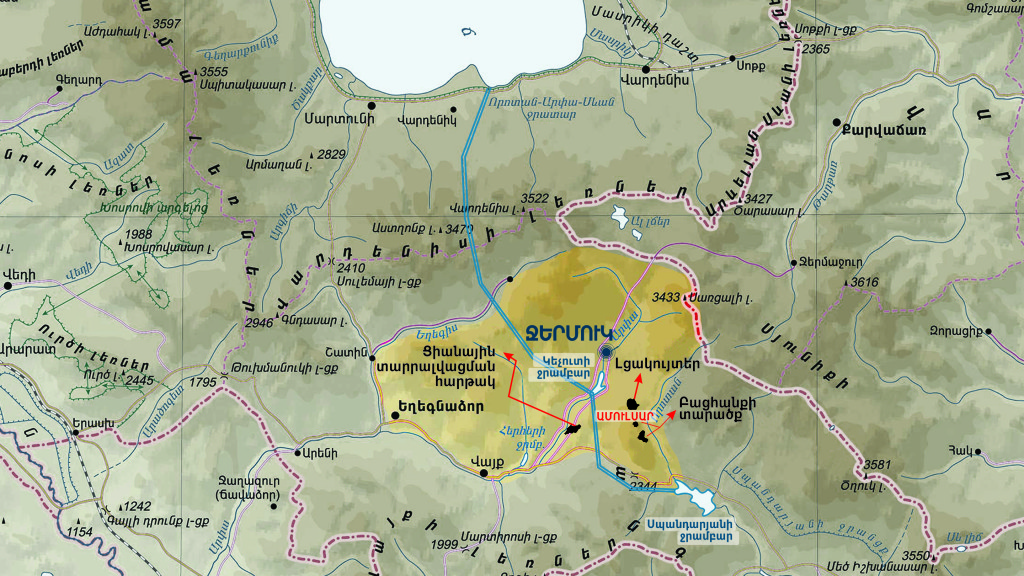Cronimet says it is reponsible, ZCMC acts the opposite way
ZCMC, photo by Ecolur
Cronimet German company that owns 60% in the company Zangezur Copper Molybdenum Combine (ZCMC) exploiting Kajaran mine, Armenia, recently responded to business-humanrights.org platform’s enquiry. The subject of the inquiry was actually raised by Armenian Environmental Front (AEF), a local civil initiative that has been alarming about some of the violations of local laws by the company as well as concerns with its environmental performance (more in here and here). In its response (which can be found here) that came after Business and Human Rights Resource Center placed the corresponding article on its website, the company states that it adheres to the policy of sustainable development and that it has no purpose to avoid obligations laid by laws in Armenia.
As a reminder, AEF published an article where it showed the illegal increase of the amount of ore extracted from the Kajaran mine by the company. It mentioned that “…starting from 2010 ZCMC illegally increased its extraction volumes, while during the past five years it extracted up to 17-19 million tons annually [instead of 12.5 million tones permitted]. Thus during the past 7 years ZCMC extracted and processed 29.7 million tons more ore than permitted as a result of which same amount of additional ore wastes were dumped into Artsvanik tailing, thus increasing the volume of environmental pollution.”
The company replied to this that since according to Armenia’s laws, any changes in mine exploitation are subject to environmental impact assessment (EIA) and expertise, the company followed the procedure, held 4 discussions with affected communities and stakeholders and eventually finalized its EIA. In December 2016 the EIA was approved by Armenia’s government.
But what the company doesn’t mention in its reply is why in such a case prior to the date of approval of EIA by the government, it had already started increasing its extraction volumes. Even World Bank’s report on Armenia’s Strategic Mineral Sector Sustainability Assessment dating back to April 2016 clearly mentions that “Kajaran copper-molybdenum mine produces some 18.5Mt of ore per year (as compared to the permitted 12.5 Mt/yr) at grades of 0.25% Cu and 0.03% Mo.”
The company goes on enumerating its responsible style of work mentioning that “as a pioneer in ensuring the standards of sustainable development, and as a responsible miner, “Zangezur Copper Molybdenum Combine” CJSC [subsidiary of Cronimet] has been actively involved in the implementation of the EITI international standard in the Republic of Armenia.” EITI (Extractive Industries Transparency Initiative) is a global standard for promoting open and accountable management of extractive resources. Armenia applied to become member of EITI only in March 2017 and currently it is a candidate country. Thus it is unclear how Cronimet had been implementing EITI standard in the Republic of Armenia prior to Armenia’s application, especially if we take into consideration that this is a multi-stakeholder tool implemented in cooperation with the government and the civil society.
The company also speaks about holding 4 public discussions, however, some of the hearings were held at the company’s premises, during which the company’s Deputy Director notified some of the participants, including Ecolur (environmental news agency) and some others that the area belongs to the company and thus they can remove guests from the area. It must be mentioned though that public hearing must be open for all stakeholders and media. Moreover, the local NGOs wrote an open letter to the Kapan Mayor, demanding to annul the public hearing, which was not in line with laws since the information regarding the project amendments was not available on the state agency websites (local municipality’s, Ministry of Nature Protection’s website). While Cronimet states that “We do not in any way try to avoid public law obligations via arbitrary interpretation of legal provisions”, its actions contradict its words, as the procedure of public notification and discussions, particularly free access of the participants to the venue of the hearings, right to freely express their opinion, right to availability of discussed documents were all violated.
In response to this open letter the company labeled the civil society representatives as not understanding the purpose of the public hearing, who try to undermine the procedure and thus probably doing so under some pressure. Meanwhile, during the public hearing itself the company had announced there were technical problems due to which it couldn’t upload the files prior the hearing. In such a situation the public hearing should have been cancelled, yet it did not happen.
An opinion regarding how else the company is trying to arbitrary interpret laws in Armenia can be found in yet another article about the company’s desire to remove its obligations from re-cultivation process of is tailing (more on violations can be found here and here).
In response to the statement that the industrial accidents leading to polluting emissions are frequent at the factory, the company says that “only exceptional cases of accidents have been reported during the recent years … in particular: 2 accidents (emission) in 2013, 1 accident (emission) in 2014, 0 accident in 2015, 1 accident (emission) in 2016.” Yet according to this piece, only between 2014-2015 there have been 13 accidents as a result of which tailings polluted the nearby communities and the rivers. As a result of the latest accident in January 2017 as a result of which wastewaters poured into river for about 12 days, the ZCMC has been liable to pay 6.33 million Armenian drams (around 13.000$). Hetq investigative journalists covered this and other accidents.
To read more on earlier cases of environmental pollution due to technical damages of the tailing pipes, as well as public criticism can be found here, here, here, here, here. Importantly, polluted rivers in their turn have led to increase of contaminated agricultural products posing serious risks for human health.
Some other violations resulted by state-company close cooperation were exposed by Armenia’s Human Rights Defender’s office report dating back to 2012. It shows that there was violation of access to information as well as possible violation of property rights in the communities nearby the mine, since Armenia’s government declared the agricultural lands near the mine as eminent public domain with the purpose to lease them to ZCMC “for open-pit expansion and placement of burial grounds for hazardous waste.” Meanwhile, there has been no proper consultation with the locals.
The report states that “whereas in order to get clarifications upon the raised question if there are lands belonging to the citizens by leasing or property right in the areas recognized as eminent domain we sent a range of requests to the Prime Minister of Armenia, which were later readdressed to the Ministry, however, no clear information was rendered in response. In the course of interviews with the lawyers and specialists of the field conducted in 2012 on the initiative of Defender’s staff numerous complaints were received on the fact that no proper public discussions with the participation of beneficiaries were held over the recognition of the frontier Qajaran village in Syuniq marz and other 4 regions in neighborhood of Armenia-Iran interstate highway as eminent domain, and their positions were not considered.”
Another report of the Human Rights Defender’s office dating back to 2014 states that “the studies conducted by the Ministry have demonstrated that the exploitation of the Kajaran open mine doesn’t cause air pollution. However, studies by independent industry experts suggest that the exploitation of the Kajaran open mine causes air pollution as a result of which a number of children were diagnosed with cancer-causing substances.”
Reading the response by Cronimet, one may think that the company in Germany has no clue of happenings in Armenia, yet the brief description of social responsibility on its website and no mention of human rights or human rights due diligence process whatsoever makes it clear, that the overall strategy of the company has more to do with expanding the horizon of mining (as their logo states) with little or no care for its impacts on others.
Armenian Environmental Front (AEF) civil initiative










